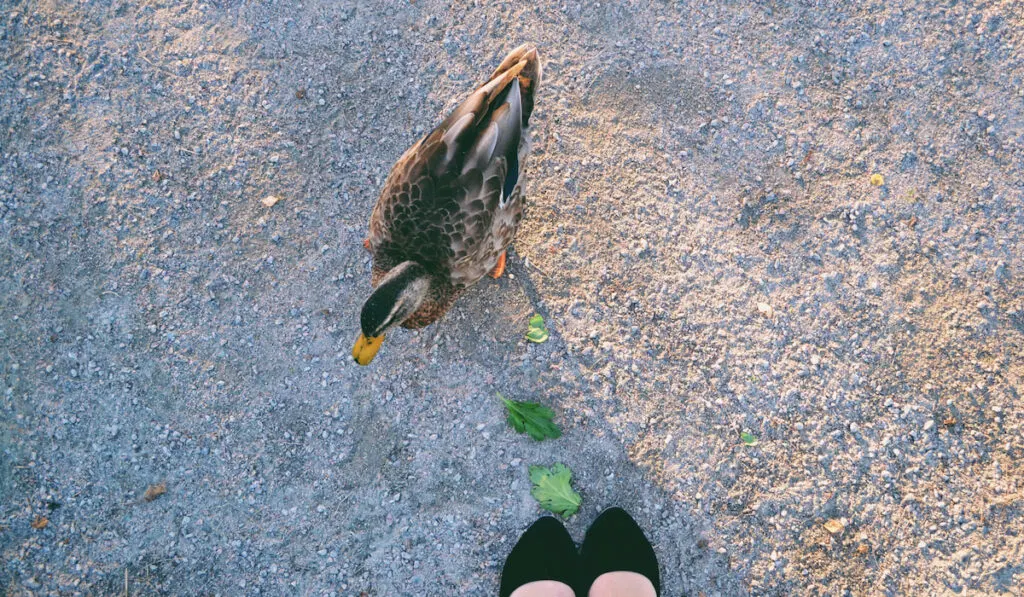With the help of service animals, people with disabilities can do tasks that they might otherwise struggle with or be unable to perform. The most common service animal you’ve probably seen is a service dog. But did you know that many other animals can serve as helpers to humans?
Can a duck be a service animal?
Ducks can not be service animals. According to the Americans with Disabilities Act (ADA) of 1990, only dogs can be considered service animals. In some states, exceptions are made for miniature horses if they have been properly trained.

But while ducks can’t be service animals, they can be used as emotional support animals or therapy animals. Do you know the difference between service, emotional support, or therapy animals?
What makes a duck viable for one type but not the other? Let’s take a look at how our feathered friends can help humans.
Table of Contents
What Are Service Animals?
Service animals are animals trained to perform specific roles for their disabled owners.
People who are blind, deaf, lame, or have other disabilities can use trained animals to help them do things that they can no longer do. Some service animals uses include:
- Open doors
- Understand traffic signals
- Alert their owners of sounds
- Help their owners cross the road
- Guide their owners through a crowd
While the Americans with Disabilities Act (1990) limits service animals to dogs, many states make exceptions if the animals are trained or the human need is unique.
Several states permit miniature horses or helper monkeys as service animals. In Montana, cats, wolves, and birds can be designated as service animals.
Service animals are certified by doctors and other relevant professionals. With an approved certificate, a service animal can follow its owner to any place (even if there is a “no pet allowed” sign). Service animals can also follow their owners without a leash.

Types of Service Animals
Service animals are categorized into three main groups:
- Guide Animals: Trained to assist blind or visually impaired people.
- Hearing Animals: Trained to assist deaf or hearing impaired people.
- Other Service Animals: Trained to help owners with other disabilities or challenges for tasks that can not be completed independently.
While the primary goal of a service animal is to assist with tasks or fill gaps in human abilities, there are other ways that our animal friends, including ducks, can help us.
Differences Between Emotional Support Animals and Therapy Animals
Emotional support animals serve as companions for individuals with mental or emotional disabilities. They usually provide emotional support for the same owner.
The company these animals provide can be a comfort to people with psychological challenges. While service animals are trained, emotional support animals typically do not require any training.
Therapy animals are trained or approved to offer comfort in settings beyond their own home. They often visit hospitals or nursing homes to provide additional comfort to people who are suffering.
Their training includes more focus on how to behave around many different types of people, rather than performing specialized tasks.
Since the work of emotional support and therapy animals is less task specific, many more animal species can be used in this way.
Concerns Over Emotional Support Animals

Emotional support animals clearly provide valuable assistance to their owners. However, there are concerns that people take advantage of the exceptions provided to emotional support animals.
There are cases where people attempt to have their pets certified as emotional support animals so that the animals will be allowed into places where regular pets cannot enter.
Can Ducks Be Therapy Animals?
To become a therapy animal, the individual animal must be certified. Remember that therapy animals offer physiological or psychological assistance to patients with trauma or people in need of therapy.
If a duck can be trained to work as a therapy animal and demonstrate the proper skills or demeanor, then it could receive a therapy animal certification. This designation is left to the discretion of professionals who evaluate each animal and where the owner intends to bring it.
Facilities, such as nursing homes, may also have limitations on the types of therapy animals they allow inside for noise, cleanliness, and allergy considerations.
Can Ducks Be Emotional Support Animals?
Emotional support animals do not need any training. As long as it is certified by a psychiatrist or relevant professional, a duck can become an emotional support animal.
Remember that emotional support animals help their owners psychologically by providing companionship and comfort. Patients under trauma or people undergoing forms of mental stress can benefit from an emotional support animals.
Ducks can be just as capable of providing comfort (and a few smiles), especially if the person is a duck lover.
Examples of Ducks That Are Emotional Support Animals
Considering a duck as an emotional support animal for yourself or a loved one? Wondering if this option really does work? Here are two cool ducks helping their owners and making an impact.

Candy
Candy is a female Rouen Duck, and certified emotional support animal, who helps her disabled owner, Virginia Moe. Virginia raised Candy as a duckling and made a strong connection with Candy. Candy prefers being around humans and barely spends time with other ducks.
Candy helps Virginia by alerting her of strange sounds. Candy also cuddles and plays with her owner. She accompanies Virginia out of the house to the library, fairs, and schools. Candy wears a diaper to prevent her from making an unwelcome mess. (Source)
Daniel
Daniel the duck is a designated emotional support animal for his owner, Carla Fitzgerald. Carla was severely injured in a car accident on her way to work and left unable to walk for six months.
A year prior, Carla had bought Daniel at a fair for just $6. During her recovery, Daniel became a comfort to her throughout an extremely difficult time in her life.
Daniel will cuddle with Carla, giving her pecks and neck hugs. Carla takes Daniel along with her whenever she’s traveling, and he continues to give her support while she manages her injuries and the impact of the accident on her life. (Source)
Final Thoughts
While ducks cannot be service animals, they can become certified as emotional support animals. Professionals make these designations on an individual basis, considering the animal’s abilities and the owner’s needs.
How have you seen service, therapy, or emotional support animals make an impact for you, your loved ones, or the community? What are your thoughts on ducks providing emotional support or companionship to people in need? Share your thoughts in the comments!
Source
- https://en.wikipedia.org/wiki/Service_animal
- https://www.verywellhealth.com/what-types-of-animals-can-be-service-animals-1094527
- https://adata.org/guide/service-animals-and-emotional-support-animals
- https://esadoctors.com/emotional-support-animals-vs-service-dogs-and-therapy-dogs/
- https://www.icandog.org/the-difference-between-a-service-dog-therapy-dog-emotional-support-dog/
